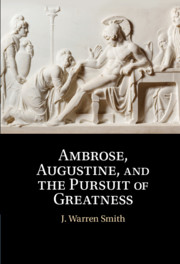Book contents
- Ambrose, Augustine, and the Pursuit of Greatness
- Ambrose, Augustine, and the Pursuit of Greatness
- Copyright page
- Dedication
- Contents
- Acknowledgments
- Abbreviations
- Introduction
- Part I The Problem of Greatness and the Great-Souled Man from Plato to Plutarch
- Part II Ambrose’s Great-Souled Christians
- Part III Augustine and the Magnus Animus
- Epilogue
- Bibliography
- Index
Introduction
Published online by Cambridge University Press: 24 November 2020
- Ambrose, Augustine, and the Pursuit of Greatness
- Ambrose, Augustine, and the Pursuit of Greatness
- Copyright page
- Dedication
- Contents
- Acknowledgments
- Abbreviations
- Introduction
- Part I The Problem of Greatness and the Great-Souled Man from Plato to Plutarch
- Part II Ambrose’s Great-Souled Christians
- Part III Augustine and the Magnus Animus
- Epilogue
- Bibliography
- Index
Summary
This book is a project in historical theology that explores the evolution of the idea of moral greatness. From the eclectic period of Hellenistic thought at the end of Classical antiquity to the polemical period of cultural contest between Christianity and paganism called late antiquity, the language commonly employed to describe an individual possessed of supreme virtue was “the great-souled man.”1 Although not exactly false cognates, the modern English words “magnanimous” or “magnanimity” do not capture the full sense of their etymological origins. For, when contemporary English speakers describe someone as being “magnanimous” or possessing the quality of “magnanimity” they usually mean that the person is gracious, generous, and/or above pettiness. While great-souled men – and in the Classical and late antique mind they were almost exclusively men – might indeed be extremely gracious, even to an enemy, μεγαλοψυχία or magnanimitas denoted so much more: namely a preeminence of character that can only be expressed in terms of sheer “greatness.” The closest expression of the ideal in American vernacular is when someone pays tribute to a man who has gone above and beyond the call of duty in being generous by saying “He is real prince.” Here the egalitarian language of a democratic society is replaced for the moment at least with the archaic language of aristocracy and royalty, a prince – one who possesses a greatness, materially and morally, surpassing the common citizen. Such language is an unconscious reversion to the original sense of μεγαλοψυχία that Aristotle used to describe the quality of the warrior-princes who lead the Greek expedition against Troy narrated in Homer’s epics. Yet, while the Homeric heroes conferred benefits on their homelands and their compatriots in arms by their martial prowess, “generosity” and “mercy” are not adjectives immediately associated with Achilles and Ajax or even Odysseus.
- Type
- Chapter
- Information
- Ambrose, Augustine, and the Pursuit of Greatness , pp. 1 - 20Publisher: Cambridge University PressPrint publication year: 2020



